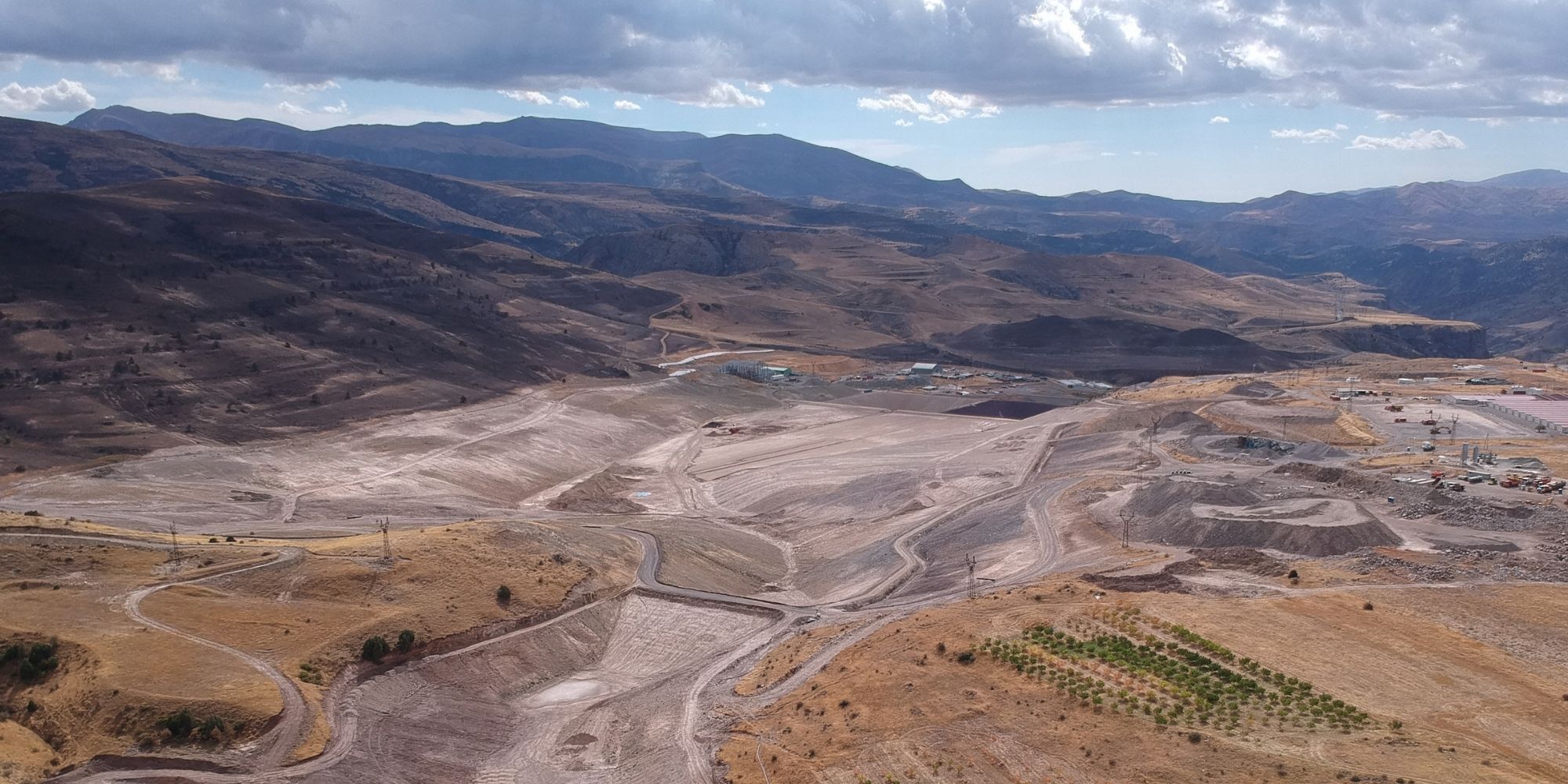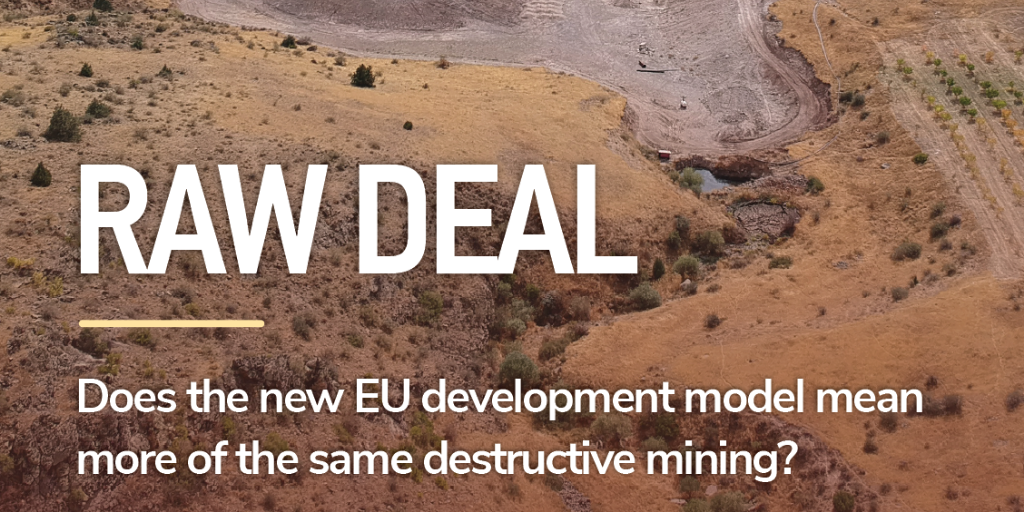ARCHIVED: Minerals mining and supply chains
Global demand for minerals and other critical raw materials is intensified by the just transition to renewable energy and the digital transformation agenda. Therefore sustainable supply chains of minerals are fundamental to addressing the climate crisis and the Covid-19 crisis that humanity is facing today. The European Union needs to innovate and find solutions to achieve its circular economy and resource use reduction objectives and to meet the demand of EU’s industry and consumers, while still protecting communities and nature threatened by mining.

Stay informed
We closely follow international public finance and bring critical updates from the ground.
Key facts
The European Green Deal plans will result in increased demand for raw materials to deliver clean energy and other high-tech solutions at the forefront of the EU’s green development plans. For example, the European Commission estimates that the EU would need up to 18 times more lithium and five times more cobalt in 2030 and almost 60 times more lithium and 15 times more cobalt in 2050 for electric vehicle batteries and energy storage. Meanwhile the EU is a net exporter of secondary materials, such as copper, aluminum and iron, and is not making enough effort to innovate and close material cycles, in order to reach its circular economy and resource use reduction objectives.
Key issues
The European Commission proposes in its Raw Materials Initiative to ‘accelerate and facilitate procedures’ for the approval of mining projects in the EU and its neighbours, such as Ukraine and the Western Balkans, as well as in partnerships with countries in Africa and Latin America. European financial mechanisms lack the tools to assess and address political, human rights and environmental risks in these countries. Current due diligence criteria of multilateral development banks, such as the European Investment Band and the European Bank for Reconstruction and Development, are not robust enough. New EU criteria for sustainable finance and binding EU legislation on human rights due diligence should ensure the application of the UN guiding principles (and hopefully soon a UN Treaty) on Business and Human rights. Investments in mining should also respect existing EU law and international conventions for protection of biological diversity and should respect no-go zones for precious ecosystems, water resources and Indigenous Peoples lands.
Background
Europe wants to be the first continent to become climate neutral by 2050 and the leader in ensuring that all of the world’s ecosystems are restored, resilient and adequately protected by 2050. However, despite the long-term goal of reducing the demand for resources and fossil fuel consumption, Europe plans to continue its exploitative model of mining raw materials in the EU and around the world.
The European Green Deal introduces a key tension between sustainability and security.
Which will be prioritised? Will Europe try to solve the climate crisis by exacerbating the biodiversity, resource and poverty crises, or will the new EU policies stemming from the Green Deal manage to propose a holistic approach to all of these? Who will make use of this transition opportunity, and will it benefit only European citizens, or will other societies also benefit?
CEE Bankwatch Network, along with its members and partners, has been monitoring investments in raw materials mining backed by public funds in the EU and around the world for years. There’s still a lot to be done to stop harmful practices in the mining sector, especially in cases where such practices are supported by the EU taxpayers.
Related projects
Amulsar,
Armenia
A gold mine poses a threat to the environment and economic livelihoods of locals, as the company plans to use cyanide to leach gold concentrate from the ore.
Mining boom,
Mongolia
A massive growth in mining of Mongolia’s vast natural resources leads to pollution and displacement of local herders and exacerbates water scarcity issues.
Kumtor,
Kyrgyzstan
Located in the majestic mountains of Kyrgyzstan, the Kumtor open pit gold mine has had several accidents in the past and inflicts ongoing environmental damage.
Chelopech,
Bulgaria
The cyanide mining project would have expanded metal extraction in the Chelopech gold and copper mine in Central Bulgaria through the introduction of cyanide leaching.
Latest news
ICT metal mining case study at jadarite mine in Serbia
Bankwatch in the media | 19 March, 2021The Government of Serbia promotes Rio Tinto investment as a project of the century, “a project that will put Serbia on the map of high …
Read moreEurope’s Green and Digital Decade could be a raw deal for people and the environment in Serbia
Blog entry | 17 March, 2021The European Commission walks a tightrope with the EU Green Deal. Despite the long-term objectives of achieving a circular economy and reducing resource use, it plans to increase raw materials mining to meet the demand for the clean energy, renewables, and other high-tech solutions that are at the forefront of the EU’s green development plans. A planned lithium mine in Serbia, vehemently opposed by local communities, is a poignant example of this tension.
Read moreNeuer Bericht: Massive Umwelt- und Arbeitsrechtsverletzungen durch EU-finanzierte Minen
Bankwatch in the media | 13 February, 2021Südwind für schärfere Regeln beim Rohstoffabbau – Missstände zeugen von mangelnden EU-Schutzbestimmungen – Faire Arbeitsbedingungen und …
Read moreRelated publications
Jadar Lithium Mine, Serbia: A Raw Deal ICT metal mining case study
Study | 15 March, 2021 | Download PDFThe Jadar River Valley in western Serbia has the potential to become home one of the world’s largest lithium mines, supplying 10% of the world’s demand and supporting the neighbouring EU’s digital transition agenda. The Serbian government, therefore, p
Oyu Tolgoi Mine, Mongolia: A Raw Deal ICT metal mining case study
Study | 1 March, 2021 | Download PDFAs Mongolia’s flagship mine project, Oyu Tolgoi is often advertised as a world-class, sustainable, safe and energy-efficient mining project, but in reality, it has been subject to controversy on multiple occasions due to corruption scandals, tax disput
Raw Deal
Report | 28 January, 2021 | Download PDFEurope wants to be the first continent to become climate neutral by 2050 and the leader in ensuring that all of the world’s ecosystems are restored, resilient and adequately protected by 2050.

